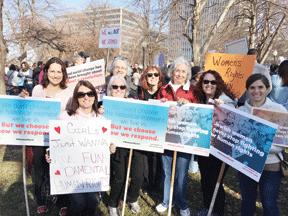
Kansas City joined hundreds of other cities across the country and around the world on Jan. 21 with a rally connected to the Women’s March on Washington, and some members of the local Jewish community helped organize the event and attended it.
Organizers estimated that 6,000 to 10,000 people had attended the rally, which was held in Washington Square Park at Pershing Road and Grand Boulevard in Kansas City, Missouri. Officer Darin Snapp, spokesman for the Kansas City Police Department, said in an email that the department estimated a crowd of about 8,000. He emphasized that there were no issues or arrests at the march.
Martha Gershun, a member of Congregation Beth Torah, was on the rally’s steering committee.
“Our goal in Kansas City was to lend our support to the Women’s March on Washington and all the affiliates’ marches around the country and the globe,” said Gershun. “Our message was inclusion and support for all people who feel vulnerable, threatened or marginalized by the incoming administration (of President Donald Trump).”
The Greater Kansas City Women’s Political Caucus co-sponsored the rally, Gershun said.
“We’re a group of concerned citizens,” she said. “It’s grassroots. It started with a bunch of women who care.”
Police had to shut down Pershing Road during the rally because of the number of attendees, Gershun said.
The New York Times, the Washington Post and ABC News reported that more than 1 million people took part in women’s marches and rallies in cities across the United States and in other countries on Jan. 21, including New York, Philadelphia, Chicago, Los Angeles, Mexico City, Paris, Berlin, London, Prague and Sydney.
Rabbi Doug Alpert of Congregation Kol Ami spoke at the Kansas City rally.
“Rest assured: If Muslims are ever required to register in this country as Jews were once compelled to do, then meet Muslim Rabbi Doug Alpert,” he said.
“Rabbi Alpert’s speech brought the house down, and when he said that, the cheers were extraordinary,” said Gershun. “I think he said what we all felt in that part on Saturday, which is: We will not let any of us be hurt or threatened.”
Gershun said that, as a member of the Jewish community, “my people know only too well what can happen when racism and bigotry and xenophobia are allowed to flourish.”
“We have a historical connection to issues of social justice and welcoming the stranger in our midst, and I felt it was important for the Jewish people, the Muslim people, people of color, the LGBTQ community, for women and immigrants and everyone else who could be hurt, that we need to stand up now,” she said. “This administration has not shown that they are trying to make people safer. They are making people more scared.”
Lisa Pelofsky is a member of Congregation Beth Shalom and also was on the rally’s steering committee. She attended the rally, she said, “because I felt that the community voices needed to be heard.”
“I was deeply concerned about the anti-woman, anti-immigrant messages that were resonating throughout the (presidential campaign) regarding intolerance,” said Pelofsky. “As a Jewish woman, I felt it was my responsibility to stand up and do something.”
All Jews should be concerned when their government talks about registries for religious practitioners, she said, and they should also be concerned about other social justice issues.
“Concern about poverty and social welfare are the foundation of the Talmud,” she said.
Pelofsky said she was moved by testimonies at the rally from victims of sexual violence, from a young Muslim student from the University of Kansas about animosity she had encountered when wearing traditional Muslim clothing, and from a young man whose family had brought him to the U.S. when he was a young child and who fears deportation.
“It personalized the plight of the various groups we’ve all been talking about and reading about, and I think the rally put faces to the stories and really drove it home,” she said.
Pelofsky said the speakers’ stories reminded her of a documentary she’d seen recently in which a person went to small towns in Germany and talked to witnesses about the Holocaust.
“The entire towns witnessed the roundups, people digging their own graves and being murdered,” she said. “The townspeople just watched because it wasn’t them. When we start talking about requiring people to register based on race or ethnicity, it’s very disturbing. And it’s no coincidence that Jewish Community Centers across the country are being harassed. As long as we back down and allow it to surface at any level, it opens us all up.”
Beth Torah congregant Henri Goettel said she had attended the rally because “one of my obligations as a Jew is the continual repair of the world, and what we were talking about were issues that are relevant.”
“When we talk about people needing to work two jobs, for example, and still not having enough to live on, that’s something that needs repair,” said Goettel. “And when people are at risk for certain kinds of illnesses but health care is difficult to get and they don’t have the ability to pay for prescription drugs — those are all issues that need to be addressed. … I resonated with every single speaker at the rally.”
Prairie Village resident Paul Temme also attended the rally. He isn’t Jewish.
“I’m not a congregant in any organized religion, but I certainly did hear the rabbi’s speech, and his point about Trump wanting to register Muslims,” Temme said. “I went to the rally because I oppose most of the policies I anticipate the Trump administration to bring, whether it’s Medicare, Social Security, international policies including NATO — but the thing that most concerns me about Trump and at least a cadre of his followers is misogyny. That’s a very great concern for me.”



